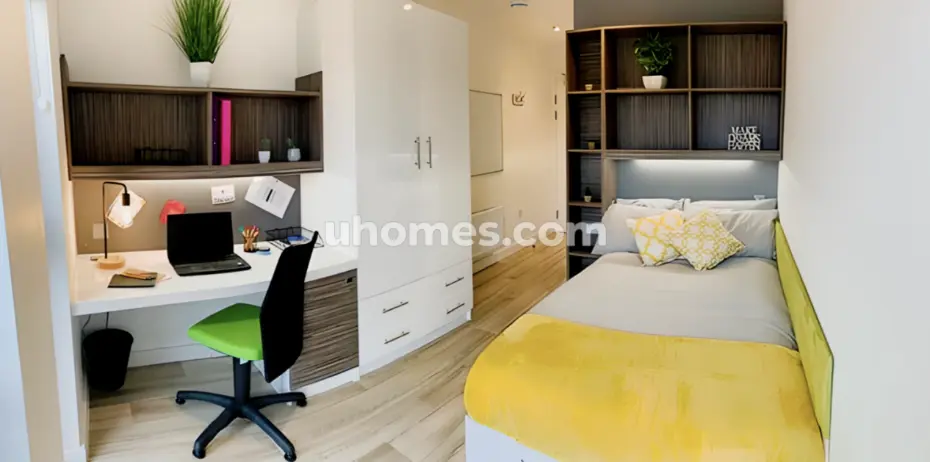Components of Cost of Living for Students at Newcastle University
1. Newcastle Student Accommodation
uhomes.com offers a range of student accommodation in Newcastle upon Tyne, including private student apartments and shared houses. Depending on room type, off-campus accommodation typically ranges from £104–£150 per week in Newcastle. For example:
- Standard ensuite rooms (shared kitchen, private bathroom) average £110–£130/week.
- S tudio apartments (private kitchen and bathroom) cost £119–£260/week, with luxury options exceeding £270/week.
Off-campus shared apartments are cheaper, averaging £70–£100/week. Most of our student accommodations are bills-included, while private rentals may require security deposits (usually 4–6 weeks’rent). Early booking is advised, as demand spikes before term starts.
uhomes.com offers diverse student accommodation in Newcastle that meets varying needs and budgets, ensuring affordability and convenience for international students. The platform features multiple room types, including En-suite, Studio, Non-en-suite,and 1-2 Bed Apartments, with weekly rents starting as low as £104 for compact options. These accommodations prioritize proximity to universities, are located steps away from campus and offer free shuttle services to libraries.
The platform emphasizes cost-effectiveness through early-bird discounts, cashback promotions, and inclusive utility packages (often covering water, electricity, and internet), reducing hidden expenses.
2. Food and Grocery
Self-cooking is the most budget-friendly option. Monthly grocery costs average £120–£170 for essentials like pasta, vegetables, and meat. Key price examples:
Chicken breasts: £5/kg, rice: £3/4kg, milk: £1.50/2L.
Discount supermarkets like Lidl or Alderley offer 20–30% savings compared to Tesco or Sainsbury’s.
Eating out is costlier: a meal at a mid-range restaurant costs £12–£20, while takeaways average £8–£15. Students can save by using university-free breakfast programs during exams. Monthly food budgets vary widely: £150–£300, depending on dining habits.
3. Transportation Costs
Newcastle’s compact city centre reduces reliance on public transport.
Key options:
Bus: A single ticket costs £2.40, with weekly passes at £15–£20 9. Students can save 30% with a Young Person Coach Card (£30/year). A wide range off-campus accommodation near Newcastle University has with easy access to the bus stations.
Metro: The Tyne and Wear Metro connects Newcastle to suburbs, with fares starting at £2.60 for short trips. A monthly student pass costs £55.
Cycling: Second-hand bikes cost £80–£150, with free bike repair stations on campus. Most students walk or cycle daily, keeping transport costs under £30/month.

4. Entertainment
Social activities in Newcastle are affordable but add up quickly:
Cinema tickets: £10–£15 (student discounts available).
Pubs: Pints cost £4–£5, and club entry fees range from £5–£15 8.
University societies: Many clubs (e.g., sports, arts) charge £10–£30/year for membership.
Formal events: College balls or dinners cost £30–£80 for tickets and attire.
Budgeting £50–£100/month covers casual outings while splurging on trips (e.g., Edinburgh for £20 by train) requires extra planning.
5. Miscellaneous Costs
Textbooks and supplies: £30–£100/semester, mitigated by buying used or using library resources.
Mobile plans: SIM-only contracts start at £10/month for 10GB data.
Clothing: High-street brands like H&M offer jeans for £30–£50, while charity shops sell second-hand items for under £10.
Health: NHS surcharge (£470/year) is mandatory for international students, but most treatments are free.
Unexpected expenses (e.g., replacing lost keys: £50–£100) should be factored into a £50/month emergency fund.
How to manage your finance in Newcastle as a student?
Managing finances as a student in Newcastle requires planning and discipline.
1. Start by creating a realistic budget that accounts for essential expenses like rent, groceries, utilities (if not included in accommodation), and transportation.
2. Use free budgeting apps to track spending patterns and identify areas to cut back.
3. To choose affordable student housing options in areas like Jesmond or Heaton, but always confirm bills-inclusive deals to avoid surprises.
4. For daily transport, consider walking or cycling where possible–the city’s compact layout makes this feasible or invest in a Pop Card for discounted Metro/bus fares.
5. Smart spending habits can stretch your budget further. Take advantage of student discounts at local stores, cinemas, and restaurants.
6. Shop at budget-friendly supermarkets like Aldi or Lidl rather than convenience stores – both have multiple branches across Newcastle.
7. Limit nights out by pre-drinking at home and using student club entry deals (£2-5 cover charges at venues like Digital or Tup Tup Palace).
8. For course materials, borrow from the Robinson Library, buy second-hand books through Facebook student groups, or share subscriptions with classmates.
9. Boost your income through flexible part-time work while balancing your studies. Many local businesses in Newcastle city centre hire students for roles in retail (Eldon Square shops) and hospitality (Quayside bars/restaurants).
10. The Careers Service at Newcastle University often lists campus jobs with study-friendly hours. Consider freelancing skills like tutoring or graphic design through platforms like Tutorful. Always prioritize academic commitments–working more than 15-20 hours weekly may impact studies.